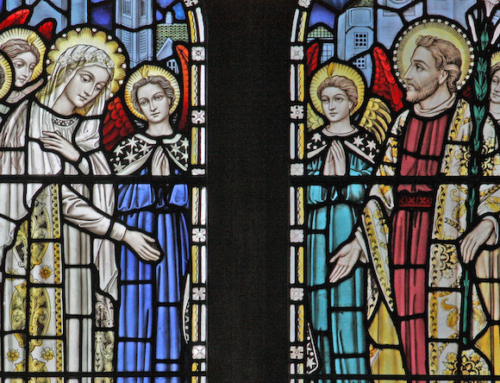“The only thing necessary for the triumph of evil is that good men do nothing.”
– Edmund Burke
Why do we do nothing? Why do we see evil and stay silent? In part, it’s because our culture excessively values tolerance as one of the highest social virtues. We’re afraid of speaking out against evil because we’re afraid of someone labeling us as a bigot, as the intolerant one. But opposing sin is part and parcel of Jesus’ commandment to “love your neighbor.” For, far from being bigotry, admonishing or warning the sinner is an act of mercy (in fact, it’s traditionally named as the third spiritual work of mercy). Despite its difficulty, speaking out against sin is a task given to every Christian— it is a prophetic task, a task of love.
Through our Baptism, we are all made prophets of God. A prophet proclaims the Word of God. This is the source of the prophet’s strength, for when he speaks against sin, he does not do so on his own. Rather, his admonition flows from his prayer, where he listens to God’s word and intercedes for his neighbors who are trapped in their sin. Listening to God is hard, but the Old Testament gives us the examples of the prophets of Israel to help us as we undertake our own prophetic mission. For instance, we can see what God says to Ezekiel about warning the people of Israel:
So you, mortal, I have made a sentinel for the house of Israel; whenever you hear a word from my mouth, you shall give them warning from me. If I say to the wicked, ‘O wicked ones, you shall surely die’, and you do not speak to warn the wicked to turn from their ways, the wicked shall die in their iniquity, but their blood I will require at your hand. But if you warn the wicked to turn from their ways, and they do not turn from their ways, the wicked shall die in their iniquity, but you will have saved your life. (Ezekiel 33:7-9)
This passage from Ezekiel teaches us two things about warning sinners. First, God chooses to admonish sinners, not on his own, but through the prophet’s words. Admonition does not come from our own initiative. This only reaffirms our need to listen to God in prayer before we speak out against evil. Second, the prophet is called to admonish those who are in danger of death because of their sins. This teaches us that it is primarily mortal sins we should be admonishing. If we are always correcting others for trivialities, then we are in serious danger of unnecessarily damaging our relationships. There are gentler ways to correct the faults and venial sins of our friends, such as praying for them and striving to live a holy life so as to be examples for them to follow.
In addition to these points about how to admonish the sinner, God’s words to Ezekiel also reveal what will happen if we don’t speak out against sin. If we stay silent in the face of grave evil and the sinner eventually dies in his sin, then we too have sinned, and mortally so. However, if we do warn the sinner—even if he does not change his ways before his death—then we are free of personal guilt. We cannot control what any other person does, but we are responsible for responding to God’s word when we hear it. Speaking out may or may not lead our friends to repentance, but by staying silent it might be ourselves we damn.
Speaking against sin only once might be enough to fulfill the law and save ourselves, but as St. Paul says to the Corinthians before his hymn to Love, “I will show you a still more excellent way” (1 Corinthians 12:31).
If another member of the church sins against you, go and point out the fault when the two of you are alone. If the member listens to you, you have regained that one. But if you are not listened to, take one or two others along with you, so that every word may be confirmed by the evidence of two or three witnesses. (Matthew 18:15-16)
Love fulfills and surpasses the old law. Love always demands more from us than the law. The law asks us, “Have you done everything necessary.” A single admonishment might be enough to save our own souls, if you look at the words to the prophet Ezekiel. Love, on the other hand, asks us, “Is there nothing more you can do?” Love aches until the sinner is healed. If we speak with love, speaking out against evil is no longer about us. Love focuses on healing the sinner for the sinner’s sake. To admonish our friends once and fail is not the end of our prophetic task. Love gives us the strength to heed Jesus’ command and try anew with the support of our brothers and sisters in Christ.
✠
Image: James Tissot, Zacchaeus in the Sycamore Awaiting the Passage of Jesus.







